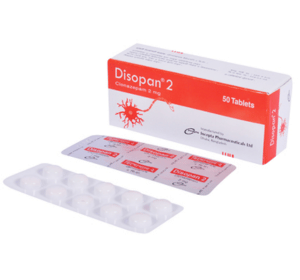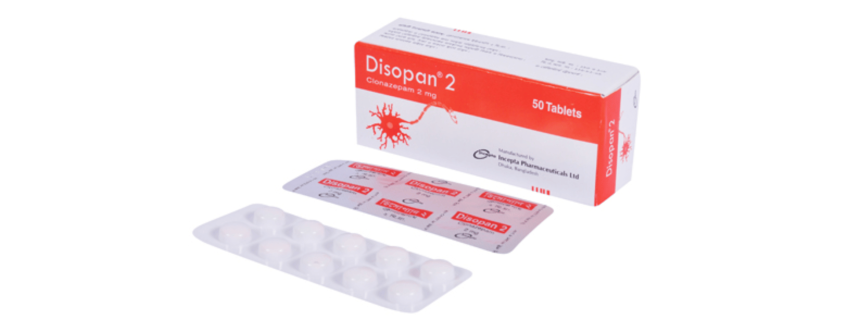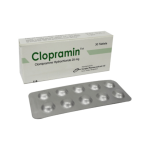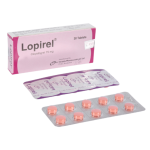Disopan(Clonazepam)

Therapeutic Group: Drugs of Nervous System
Presentation
Disopan 0.5 : Each tablet contains Clonazepam USP 0.5 mg.
Disopan 1 : Each tablet contains Clonazepam USP 1 mg.
Disopan 2 : Each tablet contains Clonazepam USP 2 mg.
Disopan 1 injection: Each vial contains Clonazepam USP 1 mg in 1 ml solution.
Description
Chemically, clonazepam is a benzodiazepine derivative. It exhibits several pharmacologic properties, which are characteristics of the benzodiazepine class of drugs. In human it is capable of suppressing the spike and wave discharge in absence seizure (petit mal) and decreasing the frequency, amplitude, duration and spread of discharge in minor motor seizure.
Indications
Tablet:
• Anxiety disorders (Generalized, Phobic & Panic disorders)
• Insomnia and sleep disturbances
• Labile arterial hypertension
• Peri and Post menopausal anxiety (Anxiety in middle aged women)
• Burning Mouth Syndrome
• Peri and Post menopausal anxiety (Anxiety in middle aged women)
• Postoperative anxiety disorder
• Post traumatic stress disorder
• Anxiety in cancer patient (palliative treatment)
• Tension Headache
• Restless legs syndrome (RLS) or Wittmaack–Ekbom syndrome
• Nocturnal myoclonus
• Tourette’s syndrome
• Bipolar affective disorder
• Resistant depression
• Drug-induced dyskinesia
• Choreiform movement
• Fulgurant pain
• Trigeminal neuralgia
• Epilespsy
Injection:
• Epilepsy
• Status epilepticus
• Myoclonic seizure
• Typical and atypical absences (Lennox-Gastaut syndrome)
• Infantile spasm
• Tonic-clonic seizure
• Partial seizure
• Absence seizure
• Focal seizure
Dosage & Administration
Tablet:
Infants and children
Initial dose: 0.01 – 0.03 mg/kg/day. Up to 1 year: 0.25 mg daily in divided dose, not to exceed 0.05 mg/kg/days increase gradually to 0.5 – 1 mg.
Increment dose: not more than 0.25 – 0.5 mg 1 – 5 years: 0.25 mg daily in divided dose, at intervals of 3 days increase to 1 – 3 mg.
Maintenance dose: 0.1 – 0.2 mg/kg/day. 5 – 12 years: 0.5 mg daily in divided dose,
Dosing interval: b.i.d. / t.i.d. increase to 3 – 6 mg.
Adults and elderly
Initial dose: 1 mg daily in divided dose (Elderly 0.5 mg), not to exceed 1.5 mg/day
Increment dose: 0.5 – 1 mg at intervals of 3 days
Maintenance dose: 4 – 8 mg/day
Maximum dose: 20 mg/day should be administered with caution
Dosing interval: b.i.d. / t.i.d.
Initial dose should be low and increased gradually to a maintenance dose that controls seizure without toxic effects. During discontinuation, the dose should be tapered.
Injection:
Infants and children: half of a vial (0.5 mg) by slow IV injection or by IV infusion. Adults: 1 vial (1 mg) by slow IV injection or by IV infusion. This dose can be repeated as required (1 – 4 mg are usually sufficient to reverse the status). In adults, the rate of injection must not exceed 0.25 – 0.5 mg per minute (0.5 – 1.0 mL of the prepared solution) and a total dose of 10 mg should not be exceeded.
Slow intravenous injection: The contents of the vial must be diluted with 1 mL of water for injection prior to administration so as to avoid local irritation of the veins. The injection solution should be prepared immediately before use. IV injection should be administered slowly with continuous monitoring of EEG, respiration and blood pressure.
Intravenous infusion: Clonazepam (the vial) can be diluted for infusion in a ratio of 1 vial (1 mg) to at least 85 mL diluting media. The diluting media can be any of the following: sodium chloride 0.9%; sodium chloride 0.45% + glucose 2.5%; glucose 5% or glucose 10%. These mixtures are stable for 24 hours at room temperature. Infusion bags other than PVC should be used for infusing Clonazepam. If PVC infusion bags are used then the mixture should be infused immediately or within 4 hours. The infusion time should not exceed 8 hours. Do not prepare Clonazepam infusions using sodium bicarbonate solution, as precipitation of the solution may occur.
Intramuscular injection: The IM route should be used only in exceptional cases or if IV administration is not feasible.
Side Effects
Tablet:
The most frequently occurring side effects of clonazepam are referable to CNS depression, drowsiness, fatigue, dizziness, muscle hypotonia, co-ordination disturbance, hypersalivation in infants, paradoxical aggression, irritability and mental change.
Injection:
Some side effects, like: fatigue, muscle weakness, dizziness, somnolence, light-headedness, ataxia, restlessness, hypersalivation in infants, paradoxical aggression, reduced co-ordination may occur with Clonazepam therapy but these effects are transient and generally disappears in the course of the treatment. Respiratory depression may occur in patients with pre-existing airways obstruction, or brain damage, or if other medications which depress respiration have been given. As a rule, this effect can be avoided by careful adjustment of the dose to individual requirements.
Precautions
Tablet:
When used in patients in whom several different types of seizure disorders coexist, clonazepam may increase the incidence or precipitate the onset of generalized tonic-clonic seizures (grand mal). This may require the addition of appropriate anticonvulsants or an increase in their dosages. The concomitant use of valproic acid and clonazepam may produce absence status. Periodic blood counts and liver function tests are advisable during long term therapy with clonazepam.
The abrupt withdrawal of clonazepam, particularly in those patients on long-term, high-dose therapy, may precipitate status epilepticus. Therefore when discontinuing clonazepam, gradual withdrawal is essential.
Clonazepam may produce an increase in salivation. This should be considered before giving the drug to patients who have difficulty handling secretions. Because of this and the possibility of respiratory depression, clonazepam should be used with caution in patients with chronic respiratory diseases.
Because of the possibility that adverse effects on physical or mental development could become apparent only after many years, a benefit-risk consideration of the long-term use of clonazepam is important in pediatric patients.
Injection:
The concomitant use of Clonazepam with alcohol and CNS depressants should be avoided. Such concomitant use has the potential to increase the clinical effects of Clonazepam, such as: severe sedation, respiratory and cardiac depression. In some cases, dose adjustment of other medications is necessary. Clonazepam may produce an increase in salivation. This should be considered before giving the drug to patients who have difficulty handling secretions. Clonazepam is adviced to use with caution in patients with chronic respiratory diseases. Because of the possibility that adverse effects on physical or mental development could become apparent only after many years, a benefit-risk consideration of the long-term use of clonazepam is important in pediatric patients.
Use in Pregnancy & Lactation
The use of clonazepam during pregnancy or lactation should be avoided. Clonazepam is excreted into the breast milk and should therefore be avoided in breast-feeding mothers.
Drug Interaction
Tablet:
The CNS-depressant action of the benzodiazepine class of drugs may be potentiated by alcohol, narcotics, barbiturates, nonbarbiturate hypnotics, antianxiety agents, the phenothiazines, thioxanthene and butyrophenone classes of antipsychotic agents, monoamine oxidase inhibitors and the tricyclic antidepressants, and by other anticonvulsant drugs.
Injection:
The CNS-depressant action of the benzodiazepine class of drugs may be potentiated by alcohol, narcotics, barbiturates, nonbarbiturate hypnotics, antianxiety agents, the phenothiazines, thioxanthene and butyrophenone classes of antipsychotic agents, monoamine oxidase inhibitors and the tricyclic antidepressants, and by other anticonvulsant drugs.
Over Dose
Tablet:
Symptoms of clonazepam overdosage, like those produced by other CNS depressants, include somnolence, confusion, coma and diminished reflexes.
Injection:
Symptoms of Clonazepam overdosage, like those produced by other CNS depressants, include: somnolence, confusion, coma and diminished reflexes.
Commercial Pack
Disopan 0.5 : Each box contains 10 blister strips of 10 tablets.
Disopan 1 : Each tablet contains Clonazepam USP 1 mg.
Disopan 2 : Each box contains 5 blister strips of 10 tablets.
Disopan 1 injection: Each box contains a vial of Clonazepam 1 mg in 1 ml solution and 1ml ampoule of water for injection.



